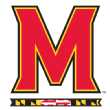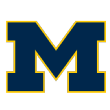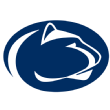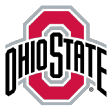The first half of the college football season was defined by a lack of challengers at the top. Clemson and Alabama have more than looked the part. Georgia is close, Notre Dame is hovering around the conversation, and BYU should get a look. But the Big 12 has all but eliminated itself from the conversation, and other potential SEC contenders have proved to be fatally flawed. It has basically been the top 3 and a wide chasm.
The reinforcements have arrived. The Big Ten opens play this weekend and the teams ranked first (Ohio State), fifth (Penn State) and sixth (Wisconsin) in SP+ will finally have their respective seasons underway, not to mention two more top-20 teams (Michigan and Minnesota) and plenty of other potential top-25 teams.
Can Ryan Day’s Buckeyes clear the ridiculously high bar they set last year? Can James Franklin’s Nittany Lions finally figure out how to shift from great to elite? The answers are finally on the horizon. Let’s preview the Big Ten East, from my projected worst to best teams.
Jump to: Rutgers | Maryland | Michigan State | Indiana | Michigan | Penn State | Ohio State
Head coach: Greg Schiano (first year of second tenure; 68-67 at RU overall in 11 seasons)
2019: 2-10 (0-9 in Big Ten), 117th in SP+
2020 projection: 1-7, 109th
Five best returning players: LB Tyreek Maddox-Williams, WR Bo Melton, LB Tyshon Fogg, WR Isaiah Washington, S Christian Izien
We all have our dramatic side, even coaches. When they proclaim that allowing players to transfer one time without having to sit out — a rule likely coming to college football once any level of normalcy is again attained — will cause mass chaos and “free agency in college football,” they’re clearly being a little bit melodramatic. There’s no question, though, that such a rule would change things. Some teams already are leaving a couple of regular spots open in each signing class for transfers. That’s a slight change that could add up across 130 FBS schools.
It could have a massive impact on rebuilding projects. For evidence, look to Rutgers. Schiano began his second stint in Piscataway by not even waiting for the waiver rule to take effect. He signed 17 freshmen — half of whom enrolled early — and then started loading up on transfers.
Schiano nearly signed a full class’ worth of Division I athletes via the transfer portal. It was like the Big Ten and other schools allowed them to convene an expansion draft.
There are a few semiproven pieces in there. Cruickshank is a dynamite return man, Vedral completed 34 of 52 passes as a 2019 fill-in and players such as White, Dwunfour and Burke were at least rotation pieces. Schiano’s bold gesture made one thing clear: He wasn’t particularly impressed with the talent he inherited from Chris Ash and felt the immediate need to upgrade.
Of course he wasn’t.
Schiano left for the NFL after a 9-4 campaign in 2011, and while the Scarlet Knights held on for a bit in his absence — they won 23 games from 2012-14 — the house fell to the ground in 2015, their second year in the Big Ten. It has remained a pile of lumber and drywall dust since. They haven’t ranked higher than 75th in SP+ since 2012, but last year might have been rock bottom. The Knights doubled their win total (from one to two) but fell to 117th, easily the worst among power conference programs.
The Knights aren’t completely devoid of talent. Receivers Bo Melton and Isaiah Washington each averaged more than 14 yards per catch, and while the defense hasn’t been good, it has still averaged a top-80 defensive SP+ ranking over the last four years — not destitute, at least. But this is a rebuilder’s rebuilding job, and Schiano knew what he was getting himself into. He signed an exciting young offensive coordinator in Sean Gleeson, who helped to craft a burly but modern attack at Princeton, then spent last year studying under Mike Gundy at Oklahoma State. His moves have been logical and intriguing. And almost none of them will result in any massive improvement in 2020.
Head coach: Mike Locksley (3-9, second year)
2019: 3-9 (1-8), 96th in SP+
2020 projection: 2-6, 84th
Five best returning players: LB Ayinde Eley, S Jordan Mosley, RB Tayon Fleet-Davis, WR Dontay Demus Jr., LB Chance Campbell
In the Big Ten West preview, I wrote about how Minnesota’s season plotline changed pretty significantly from mid-September (mediocre and lucky) to the end of the year (best team/season in ages). I guess that means Maryland was Bizarro Minnesota.
After working for eight seasons to get another head-coaching shot after a disastrous 2-26 stint at New Mexico, Mike Locksley couldn’t have started out better. His Terps beat Howard 79-0, then humiliated what we (incorrectly) thought was a decent Syracuse team 63-20 in Week 2. Virginia Tech transfer Josh Jackson had 541 passing yards and seven TDs, and everything Locksley and coordinator Scottie Montgomery dialed up worked. The Terps had their highest AP ranking in 16 years (No. 21). What a turnaround story they were writing in College Park.
They won only once more the rest of the way, and it only sort of counted (at Rutgers). They lost to four SP+ top-15 teams by an average of 56-8. Rutgers aside, they stayed within 26 points of just two other conference opponents. The run game remained decent — Anthony McFarland Jr. and Javon Leake combined for 1,350 yards — but the Terps could neither pass nor stop opponents from passing. They finished 96th in SP+, their worst showing since 1997.
It was a demoralizing collapse, though you can at least explain some of it away with injury and youth. Jackson’s form had already trailed off by October, but he battled ankle injuries from there. Plus, last year’s top five receiving targets were all sophomores. And of the eight players who started at least once on the offensive line, four were freshmen or sophomores, and three were former blue-chippers, including tackles Jaelyn Duncan and Marcus Minor. Jackson opted out of the season, but Alabama transfer Taulia Tagovailoa‘s waiver to immediately play was smiled upon by the NCAA’s Wheel of Random Destiny. McFarland and Leake are gone, but the offense at least won’t get worse as long as senior back Tayon Fleet-Davis is ready to take on a larger load.
Veteran Jon Hoke took over the Maryland defense last year and was able to craft a solid run defense that invaded the backfield with regularity. Unfortunately, you could get around this relative strength with the forward pass. The Terps had no semblance of a pass rush (124th in sack rate), the only player with more than two sacks (Keandre Jones) is gone. That did a disheveled secondary no favors. Three key sophomores — blue-chip safety Nick Cross and corners Lavonte Gater and Deonte Banks — could drive improvement in the back, but with the loss of Cross and three of five primary linemen, it might be hard to avoid regression in run support.
Maryland always has some elite athletes, but it doesn’t usually have enough, and it’s hard to say this year will be any different. If Tagovailoa is eligible, and the young receivers develop, then the offense should be fun. But both the run game and run defense could regress.
Head coach: Mel Tucker (first year)
2019: 7-6 (4-5), 42nd in SP+
2020 projection: 3-5, 51st
Five best returning players: LB Antjuan Simmons, DE Jacub Panasiuk, LG Luke Campbell, C Matt Allen, S Xavier Henderson
Mel Tucker has lived a few coaching lives and is still only 48 years old. An NFL defensive coordinator for most of 2008-14, he took part in the Nick Saban Coach Rehabilitation Project, spending a year as Alabama’s DBs coach in 2015 before moving to Georgia with Kirby Smart. He was defensive coordinator in Athens for three years before finally landing his first head-coaching job at Colorado in 2019 … and then landing his second head-coaching job at Michigan State in 2020.
Tucker’s first and only Colorado team was almost exactly like the one he had inherited. The Buffs were 5-7 and 80th in SP+ in 2018, 5-7 and 81st in 2019 (albeit with a better offense and worse defense). But his 2020 Colorado recruiting class ranked 34th per ESPN, better than all but one class since 2013, and that was evidently enough for Michigan State to bring him aboard after Mark Dantonio retired in February.
His first Michigan State class currently ranks only 46th, and it might be hard for him to make an immediate impression on the field. He inherits from Mark Dantonio a program that slipped in recent years. The Spartans averaged just 6.8 wins and a 36.5 SP+ ranking over his last four years, and of the 13 defenders to log at least 300 snaps last year, eight are gone.
Tucker made a strong defensive coordinator hire in Scottie Hazelton, who coached for Craig Bohl at North Dakota State and Wyoming and engineered improvement in his lone year at Kansas State. The Spartans averaged a No. 13 defensive SP+ ranking over the past nine seasons, and the return of ends Jacub Panasiuk and Drew Beesley and linebacker Antjuan Simmons gives Hazelton some fun pieces on the edge of the front seven. But depth is a severe issue across the board, especially at both defensive tackle and a cornerback position that boasts a couple of former star recruits and almost no experience after junior Shakur Brown.
The offense will be dealing with quite a bit of turnover, too, but losing players from a persistently bad offense doesn’t leave as much of a mark. After topping out at 12th in offensive SP+ in 2014, the Spartans regressed for four straight years to 112th in 2018, and Dantonio’s “don’t fire everyone, but give them all different roles” gambit resulted only in improvement to 91st last fall.
New coordinator Jay Johnson came with Tucker from Boulder to East Lansing after engineering strong improvement last year, but in 10 years as an FBS OC, he has fielded just one top-50 unit (41st at Louisiana in 2012). He’ll presumably start either junior Rocky Lombardi (just 7-for-21 with two interceptions last year) or redshirt freshman Payton Thorne at QB, and while he has two big backs (Elijah Collins, Connor Heyward) and an experienced line, only one returning wideout had more than 200 receiving yards last year (sophomore Tre Mosley), two if you count WMU transfer Jayden Reed‘s 2018 production.
Head coach: Tom Allen (18-20, fourth year)
2019: 8-5 (5-4), 23rd in SP+
2020 projection: 4-4, 32nd
Five best returning players: QB Michael Penix Jr., CB Tiawan Mullen, WR Whop Philyor, TE Peyton Hendershot, S Juwan Burgess
In 2019, Tom Allen’s Indiana Hoosiers came close to doing what only two Hoosier teams — the 1945 and 1967 editions — had ever done: win nine games. Only two last-second scores by Michigan State and a late two-touchdown comeback by Tennessee in the Gator Bowl prevented them from pulling it off.
Technically the 2020 squad could win nine, but only technically. A schedule that features 10 games, max, will create far too high a bar. Still, the Hoosiers could very possibly field a top-25 level team capable of upsetting one or two of the four projected top-20 teams on the schedule (Penn State, Michigan, at Ohio State, at Wisconsin).
0:56
Pat McAfee is interested in seeing if the Big Ten can pull off the full eight-game schedule and have a representative in the College Football Playoff.
The secret to IU’s success in 2019: extreme competence. The Hoosiers somehow hadn’t ranked in the SP+ top 50 in both offense and defense since 1991 but finished 22nd and 43rd, respectively. (They were 37th in Special Teams SP+, too.) Both units could end up in the top 30 this time, though attrition in special teams could hurt that unit.
Kalen DeBoer gave IU’s offense a massive shot in the arm in his lone year as offensive coordinator in Bloomington. The Hoosiers jumped from 55th to 22nd in offensive SP+, and after DeBoer took the Fresno State head-coaching job, Allen promoted QBs coach Nick Sheridan to the OC role. The less he changes, the better. Quarterback Michael Penix Jr. was brilliant as a redshirt freshman when healthy, and Peyton Ramsey, now at Northwestern, was rock solid when Penix was hurt. The return of receivers Whop Philyor and Ty Fryfogle and tight end Peyton Hendershot give him three efficiency guys with occasional pop. He also gets both starting tackles back. The run game was a decent complement, but this team was based around the passing game last year, and it was excellent.
Twelve of Indiana’s top 19 tacklers last year were freshmen and sophomores, and you could tell. The Hoosiers were decent in the efficiency department but gave up far too many big plays on third-and-long. They’ve already lost star safety Marcelino Ball to a season-ending knee injury, but experience levels are otherwise much greater in 2020. IU returns eight linemen and linebackers who made at least four TFLs last year (nine including Stanford transfer Jovan Swann) and the secondary still returns four experienced safeties, including junior Juwan Burgess. Corner Tiawan Mullen might have been the best freshman CB in FBS last year.
Life in the Big Ten East is a fraught experience, but Allen nearly found a way to a historic win total through sheer, across-the-board competence. The Hoosiers have only a couple of true blue-chippers on the roster, but if they shore up their third-and-long defense, and DeBoer’s departure doesn’t result in a playcalling drop-off, they will present no outright weaknesses. They also start the year with a massive upset chance, hosting a Penn State team that could be looking ahead to its Halloween game against Ohio State. Opportunity presents itself, even if another shot at nine wins doesn’t.
Head coach: Jim Harbaugh (47-18, sixth year)
2019: 9-4 (6-3), 10th in SP+
2020 projection: 4-4, 17th
Five best returning players: DE Aidan Hutchinson, DE Kwity Paye, RT Jalen Mayfield, WR Ronnie Bell, LB Cameron McGrone
In a normal offseason, with a normal practice schedule and a normal preview series, I would have written back in June or so about how Harbaugh and Michigan had an opportunity to build toward a magnificent 2021 season. I would have noted that the Wolverines would be starting as few as three seniors on offense and three or so on defense and that while 2020 would probably be Michigan’s second straight with single-digit wins, it was easy to get excited about what he was putting together for the next season. Figure out your QB of the future, further develop a young but exciting offensive line and running back corps and position yourself for a run.
In the new 2020, however, technically no one has any seniors. Anyone can preserve a year of eligibility during this strange season, and while we know players will still filter out of football programs, this does seem to negate one of Michigan’s more exciting advantages. Yeah, they’ll be more experienced in ’21, but so will a lot more teams than expected.
You better play for the present, then. And you better hope that a lot of sophomores step up. Sophomores like …
* QB Joe Milton: Erratic and exciting through parts of two seasons, he’s the presumptive starter with Dylan McCaffrey entering the transfer portal. Offensive coordinator Josh Gattis raved about his “wow plays” abilities recently, but consistency is an obvious must.
* RBs Zach Charbonnet and Hassan Haskins: The duo combined for 1,348 yards and 15 TDs in 2019, and the offense surged in the second half of 2019, from 66th in offensive SP+ at the midway point to 21st at the end, as Gattis put more trust in them.
* WR Giles Jackson: An explosive returner who gained 142 yards on nine catches, mostly late in the year. Another sophomore slot, Mike Sainristil, gained 145 yards in eight catches, too. They’ll both need to make steadier contributions.
* RT Jalen Mayfield: A future first-rounder who opted out, then opted back in.
* LB Cameron McGrone: Logged 9 TFLs last year and is the only returnee of last year’s top four regulars.
* FS Daxton Hill: A blue-chipper who combined 3 TFLs and four passes defensed in 2019.
* CB Vincent Gray: A far less-touted recruit who held his own when given the opportunity.
There are some big-time veterans, too. Receiver Ronnie Bell, tight end Nick Eubanks, pass-rushers Aidan Hutchinson and Kwity Paye (combined: 22.5 TFLs, 11 sacks), safety Brad Hawkins et al. But to make a top-10 run against a schedule that features three of the top six teams in SP+ and starts at No. 16 Minnesota, Harbaugh, Gattis and longtime defensive coordinator Don Brown will need quite a few second-year guys to play like fourth-year guys. And if they do, 2021 will look exciting even without as much of an experience advantage.
Head coach: James Franklin (56-23, seventh year)
2019: 11-2 (7-2), sixth in SP+
2020 projection: 6-2, fifth
Five best returning players: TE Pat Freiermuth, DE Shaka Toney, QB Sean Clifford, S Lamont Wade, C Michal Menet
It’s difficult to set a proper bar for James Franklin’s Penn State football program at the moment. The Nittany Lions have been one of the most undeniably strong programs in the country in recent years, winning 11 games three times from 2016-19 and twice finishing sixth in SP+. Their defense has been consistently excellent, and the offense bounced back last fall from a shaky 2018. They have all the pieces they need to play at a top-10 level again in 2020.
The nation’s top programs are creating a glass ceiling of sorts, however. Clemson, Alabama and, most importantly, division rival Ohio State, have all seemingly crafted fully operational Death Stars, and Georgia’s not that far behind. After a tight loss to Ohio State two years ago, Franklin said, “We’re a great program. We lost to an elite program. And we’re that close.” That is true, but it’s hard to immediately figure out how to get closer.
PSU will have a good chance of ending up the best non-Death Star team in FBS, at least.
Despite the loss of all-world linebacker Micah Parsons to a late-offseason opt-out, the defense should have the pieces coordinator Brent Pry needs. Ends Shaka Toney and Jayson Oweh are outstanding, and the Nittany Lions return depth at defensive tackle, safety and corner. The run defense should excel again, but they had a strange issue with passing-downs breakdowns last year — they were 122nd in passing downs marginal explosiveness (a look at the magnitude of the successful plays, adjusted for field position), despite a good pass rush and a strong-on-paper secondary. Pry and company bear the burden of proof for fixing that, and they’ll have to solve their problem with a new set of linebackers.
As it did during 2016’s Big Ten title run, the Penn State offense relied heavily on big plays for success last fall. The Nittany Lions were ninth in marginal explosiveness — seventh in rushing and 20th in passing. They were just 61st in success rate, however, and an all-or-nothing attack will have to fight through some “nothing” stretches at times. They scored more than 40 points four times and fewer than 20 points three times.
New offensive coordinator Kirk Ciarrocca takes on the burden of increasing efficiency. He oversaw a brilliant Minnesota attack last year, one that combined power rushing and devastating RPO work, and he should know what to do with what is probably Franklin’s best offensive line yet and a running back corps that is very good even without Journey Brown — it still features excellent sophomores Noah Cain and Devyn Ford — and would be among the best in the country if he ends up seeing the field. But while tight end Pat Freiermuth is a luxury Ciarrocca didn’t have at Minnesota, his Gophers offense did have two incredible receivers. Junior Jahan Dotson is exciting, but at least one young, unproven receiver, maybe two — Daniel George? TJ Jones? KeAndre Lambert-Smith? — will need to play at a really high level for PSU to match Minnesota’s 2019 production and have any chance of topping Ohio State in the Big Ten pecking order.
Head coach: Ryan Day (13-1, second year)
2019: 13-1 (9-0), first in SP+
2020 projection: 7-1, first
Five best returning players: QB Justin Fields, CB Shaun Wade, RG Wyatt Davis, WR Chris Olave, LB Baron Browning
Last we saw Ohio State, the Buckeyes were taking part in an almost perfect football game. I gave the Buckeyes’ 29-23 Fiesta Bowl loss to Clemson the full 12-round title fight treatment and named it my top game of 2019. It had lead changes, controversy and an overall level of pure football talent we rarely see. Until 2020 skewed off into the darkest timeline, the offseason narrative was all about building toward Clemson-Ohio State II and, more specifically, Trevor Lawrence-Justin Fields II.
The Buckeyes had to wait a bit longer than expected, but they will begin their 2020 title and revenge quest Saturday against Nebraska. As good as both Clemson and Alabama have looked this fall, there’s no immediate reason to think Ohio State will play at a lower level. Ryan Day’s squad has a few All-American candidates:
• Quarterback (Fields)
• Running back (Oklahoma transfer Trey Sermon)
• Wide receiver (Chris Olave and Garrett Wilson)
• Offensive guard (Wyatt Davis, a potential Outland Trophy favorite)
• Linebacker (Pete Werner and Baron Browning)
• Cornerback (Shaun Wade).
And there are these players who are either sturdy, experienced pieces (left tackle Thayer Munford, tight end Jeremy Ruckert) or exciting recent blue-chippers (defensive end Zach Harrison, safety Josh Proctor).
If there’s anything close to a question mark, it might come in the trenches. Ohio State’s D-line has produced two No. 2 picks and five overall draft picks in the past two years, but three of last year’s four starters, including all-world end Chase Young, were drafted. While the odds are good that someone else will become a star out wide, be it Harrison (3.5 sacks last year), Jonathan Cooper (2.5 in 2018) or Tyreke Smith (9% pressure rate last year, second among Buckeyes linemen), they haven’t yet. And the leading returning tackle, junior Tommy Togiai, made just 12 tackles and two TFLs last year.
It’s a similar story on the O-line. Davis is incredible, and Munford and center Josh Myers are good, but a couple of recent star recruits such as sophomore tackle Nicholas Petit-Frere will have to live up to their blue-chip hype pretty quickly. They probably will.
The biggest obstacle for Ohio State or any potential Big Ten champion might simply be the total lack of margin for error. We’ve seen enough debate about the conference’s eight-game slate to know that it might be held against them as a CFP tiebreaker of sorts. But that’s only if they actually lose. SP+ projects the Buckeyes as a favorite of at least 18 points in seven of eight games. They have a 5.3-point advantage at Penn State on Halloween and would be an 8.5-point neutral-site favorite over Wisconsin in the Big Ten title game, even larger over everyone else. Ohio State is as talented as anyone in the country.






